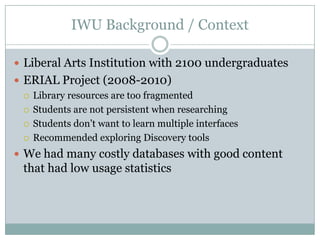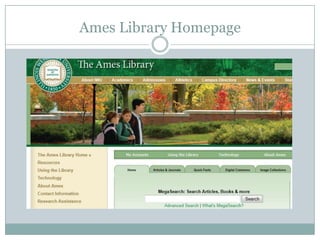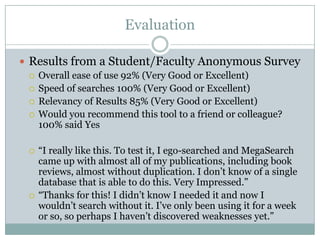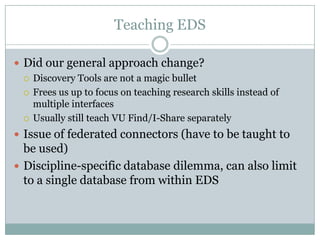Selecting implementing and teaching a web scale discovery tool
- 1. Selecting, Implementing and Teaching a Web-Scale Discovery Tool CHRIS SWEET ILLINOIS WESLEYAN UNIVERSITY ISU INFORMATION LITERACY SUMMIT 4/30/12
- 2. What do most students expect from library search tools? What is federated searching? What is web-scale searching? What is a library discovery tool?
- 3. IWU Background / Context Liberal Arts Institution with 2100 undergraduates ERIAL Project (2008-2010) Library resources are too fragmented Students are not persistent when researching Students don’t want to learn multiple interfaces Recommended exploring Discovery tools We had many costly databases with good content that had low usage statistics
- 4. Selection Process In the fall of 2010, Illinois Wesleyan University reviewed all the major web-scale discovery tools available to libraries. WorldCat Local (2007) Serial Solutions Summon (2009) Ebsco Discovery (2010) Exlibris Primo Central (2010) CARLI-Extensible Catalog Google Scholar?
- 5. Selection Process Note: Features, content, ability to customize , etc. have all been evolving on almost a monthly basis What worked for us, might not work as well for you New ILS systems from OCLC, Ex Libris and Innovative Interfaces won’t have a traditional OPAC- they will be based on a Discovery-type system
- 6. Selection Process What led us to choose EDS? IWU already had many EBSCO subscriptions Familiarity with the interface (Academic Search Premier) Ability to include things outside EBSCO licensed content (Federated) Access to more deep or “thick” metadata than much of the competition. This can include: full-text, abstracts, subject indexing. *Critical when comparing discovery tools. Peer-reviewed limiter Decent relevancy rankings (from a librarian perspective) Costs were comparable bet. EDS, Summon and Primo. “Around” $20K a year with a 3 year contract
- 7. Some questions to ask when selecting a discovery tool How many of our current library resources can be included? For items that are included do we get thick or thin metadata? Do we have any options for including resources for which you do not have a licensing agreement? How does the system handle consortial records and borrowing? What features of the tool are customizable?
- 8. Implementation Very good EBSCO support during this phase, no major problems. Consortial borrowing issues (do we want all I-Share content searched by default?) Similarly, what free content should be included? Deciding what to do about resources that are not included in the base index (what to federate?) Developing an understanding of the tool and buy in from the librarians and teaching faculty Testing, marketing Integrating the tool into the website
- 10. Problems We’re establishing an EBSCO monopoly of sorts (relevancy rankings, metadata) Known item searching wasn’t great Statistics- (below) ProQuest databases don’t play nice Lexis-Nexis: not yet part of the index Many small, one-off issues with linking, metadata problems, etc.
- 11. Successes Adoption was very quick Response has been overwhelmingly positive Almost all of our major resources are included in the main index Works when I-Share is down! In general, students are finding good resources more quickly
- 12. Evaluation IWU Student usability study Students were far more successful using EDS than other resources Never used the right-hand federated resources Occasionally applied left-hand limiters Students searched every box like a Google box Usage statistics in a discovery environment Jul-Dec 2011 28,000 sessions and 17,000 downloads, 11,000 SFX links to full-text articles not in EDS Problematic for evaluating impact on stand-alone databases, because every EDS search counts as 1 search
- 13. Evaluation Results from a Student/Faculty Anonymous Survey Overall ease of use 92% (Very Good or Excellent) Speed of searches 100% (Very Good or Excellent) Relevancy of Results 85% (Very Good or Excellent) Would you recommend this tool to a friend or colleague? 100% said Yes “I really like this. To test it, I ego-searched and MegaSearch came up with almost all of my publications, including book reviews, almost without duplication. I don’t know of a single database that is able to do this. Very Impressed.” “Thanks for this! I didn’t know I needed it and now I wouldn’t search without it. I’ve only been using it for a week or so, so perhaps I haven’t discovered weaknesses yet.”
- 14. Evaluation Paths of Discovery: Comparing the Search effectiveness of EBSCO Discovery Service, Summon, Google Scholar, and Conventional Library Resources Andrew D. Asher, Lynda M. Duke, Suzanne Wilson (Accepted for publication in College & Research Libraries, available for pre- print in early May) Study compared the effectiveness of these tools at IWU and Bucknell Universities General Findings: EDS outperformed Summon and other search systems in almost every category.
- 15. Teaching EDS Did our general approach change? Discovery Tools are not a magic bullet Frees us up to focus on teaching research skills instead of multiple interfaces Usually still teach VU Find/I-Share separately Issue of federated connectors (have to be taught to be used) Discipline-specific database dilemma, can also limit to a single database from within EDS
- 16. Closing Thoughts There’s no going back now! Interdisciplinary searching is outstanding. Getting the most out of a discovery tool is not a passive process If Google Scholar could be customized to include additional local library holdings it could be a “killer app” Death of A&I databases? A survey of incoming students this past fall discovered that none of them used their mobile devices for research. (Mobile interfaces are not as important as we thought)
- 17. Questions? Demo Searches: Wesleyan EDS http://www.iwu.edu/library/ ISU EDS http://library.illinoisstate.edu/ Summon at Arizona State: http://lib.asu.edu/

















